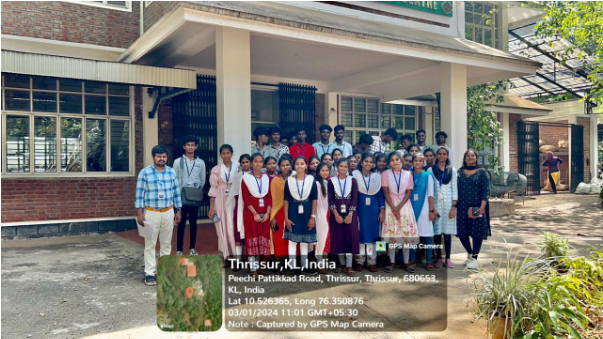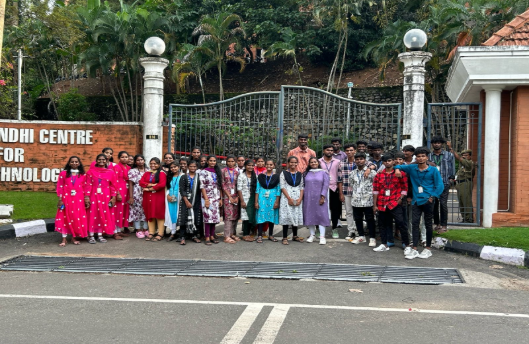The Bachelor of Technology in Pharmaceutical Technology (B.Tech Pharma) program at the Department of Pharmaceutical Technology was established in 2020. It ranks among the most sought-after courses at Gnanamani College of Technology. AICTE accredits this program and boasts a team of highly qualified faculty and technical personnel.
Pharmaceutical technology encompasses the scientific and engineering disciplines focused on developing, formulating, manufacturing, and quality control pharmaceutical products, ensuring their effectiveness and safety. The course is beneficial for understanding the processes involved in the production and purification of medicinal compounds in the laboratory/ bulk drug manufacturing industry, characterization of these compounds and stepwise handling of drug materials in formulation industry. Pharmaceutical engineers are concerned with the transformation of raw materials into valuable products by chemical, biochemical or physical processes. They are involved in the conception, design, construction, and operation of industrial plants in which the above processes take place, increasingly with design at the molecular scale being more and more significant.
Students and faculty are also given excellent opportunities to join various professional organizations such as Scopus and SCI. The program is supported by well-equipped laboratories and a comprehensive library filled with the latest and highest quality books, journals, and magazines.
Additionally, the program encourages students to engage in research, which makes them highly desirable to leading R&D firms in India. It has developed into a competitive program focused on students, designed to significantly enhance the learning experience through lab sessions, assignments, training, seminars, projects, and independent studies. One of the program's greatest strengths is the strong sense of loyalty that our alumni feel toward it.
The Department has been permanently affiliated with Anna University and accredited by NBA (National Board of Accreditation).
Pharmaceutical technology plays a crucial role in the discovery and development of new drugs and therapies.
Professionals in this area are involved in the large-scale production of drugs and pharmaceuticals, ensuring quality and safetyTo understand professional and ethical responsibility.
To broaden the inculcated knowledge to comprehend the impact of engineering solutions in global, economic, environmental, and societal contexts.
Pharmaceutical technologists can be involved in clinical trials, which are essential for evaluating the safety and efficacy of new drugs.
The graduates from this department have become professional engineers, and are employed in research institutes, laboratories, and manufacturing companies. They have become successful quality control executives and Managers in leading core companies such as Maiva Pharma, Dabur, Research Centres, etc. The department has signed MOUs with .
The department offers continuous learning through various FDP, STTP, Conferences, Seminars, Guest lectures and workshop in order to lay a strong foundation in academic.
B.Tech – Pharmaceutical Technology - 4 Years
To be the Centre of excellence in Pharmaceutical technology education, training, research and development.
| S.No | Name of the Faculty | Qualification | Designation |
|---|---|---|---|
| 1 | Mr. K. Prakash Singh | M.Tech | Assistant Professor & Head |
| 2 | Dr. K. Muthamizhi | Ph.D | Associate Professor |
| 3 | Mr. S. Kirubhakaran | M.Tech | Assistant Professor |
| 4 | Mrs. S. Nivedha | M.Tech | Assistant Professor |
| 5 | Ms. T. Divya | M.Tech | Assistant Professor |
| 6 | Mr. D. Sreenivasan | M.Tech | Assistant Professor |
| 7 | Mrs. R. Kanimozhi | M.Tech | Assistant Professor |
| 8 | Mr. G. Sabareesh | M.Tech | Assistant Professor |
| S.No | Category | Members |
|---|---|---|
| 1 |
Chairperson (1 Member) Head of the Department concerned |
Dr. V. Baskaran Dean - Chemical Sciences |
| 2 |
All Faculties Faculty members of the Department |
Faculty members of the Departments |
| 3 |
Subject Experts (2 Members) From outside the parent University Nominated by the Academic Council |
Dr. A. Arunagiri Associate Professor, Chemical Engineering, NIT Cell: 94438 08533 Email: aagiri@nitt.edu Dr. N. Samsudeen Associate Professor, Chemical Engineering, NIT Trichy Cell: 9894182441 Email: samsudeen@nitt.edu |
| 4 |
University Nominee (1 Member) Nominated by the Vice-Chancellor |
Dr. P. Selvamani Professor, Department of Pharmaceutical Technology BDU - Anna University, Tiruchirapalli Cell: 9842478785 Email: selvamani@aubit.edu.in / profselvamani@gmail.com |
| 5 |
Representative from industry/corporate sector/allied areas (1 Member) Nominated by the Principal |
Mr. R. Shurya Chief Manager, Sree Amogha Food Gallery Pvt Ltd, Namakkal Cell: 7904183832 Email: rshurya@gmail.com |
| 6 |
College Alumni (1 Member) Nominated by the Principal |
Mr. R. Nishanth Plant Operator, Sree Amogha Food Gallery Pvt Ltd, Namakkal Cell: 9629217365 Email: nishanth10072002@gmail.com |
| 7 |
Experts (1 Industrial Expert + 1 Academic Expert) Outside the Autonomous College – Special Course Formulation Nominated by the Principal |
Dr. C. Sivakumar Managing Director, Ensafe Technologies (P) Ltd., Salem Cell: 9443428302 Email: infoensafetech@gmail.com Dr. S. Renganathan Professor, Department of Biotechnology, Anna University, Chennai Cell: 9941613532 Email: srenganathan@annauniv.edu |
| Description | Count |
|---|---|
| Book Publication | 3 |
| Journal | 18 |
| Patent | 2 |
| S.NO | Name of the institution/ industry/ corporate house | Month and Year of signing MoU | Duration |
|---|---|---|---|
| 1 | Chromosoft Research Centre,43 Sundaram Pillai Street, Purasawalkam, Chennai, Tamil Nadu | December 2023 | Lifetime |
| S.No | Batch | Total Strength | Placed Students Count | Percentage |
|---|---|---|---|---|
| 1 | 2020-2024 | 50 | 25 | 50% |
| S.No | Batch | Name | Designation | Company Name |
|---|---|---|---|---|
| 1 | 2020-2024 | Deepa | Training Executive | Micro Labs, Chennai |
| 2 | 2020-2024 | Dinesh Kumar | Quality Assurance Executive | Maiva Pharma, Hosur |
| 3 | 2020-2024 | Chandru | Marketing Executive | Sun Pharma, Mumbai |
| 4 | 2020-2024 | Guna Seelan | Marketing Executive | Zifo, Chennai |
| S.No | Academic Year | Semester | Type of the Program | Name of the Program Name | Date | Total Students Participated | Whether the program is organized by / Professional Body (Name)/MOU Industry(name)/ /General |
|---|---|---|---|---|---|---|---|
| 1 | 2024-2025 | ODD | Guest Lecture | Entrepreneurial opportunities in pharmaceutical waste management | 23/11/2024 | 110 Pharma Students | IIC and EDC by Dr. M.P. Murugesan, Associate Professor, Excel Engineering College, Kumarapalayam |
| 2 | 2024-2025 | ODD | Guest Lecture | Risk Tolerance on Entrepreneurial Success | 21/02/2025 | 127 Pharma Students | IIC & EDC by Mr. Udhaya Theeran, Assistant Technical Director, Chemgenices, Dharmapuri |
| S.No | Type of the Program (Symposium, Conference, Seminar, Webinar, Workshop, Guest Lecture, IV, If others mention) | Name of the program | Date | Total Students Participated | Association with / Professional Body(Name) / MOU Industry(name) / other cells / General | Resource person details |
|---|---|---|---|---|---|---|
| 1 | Guest Lecture | Sustainable entrepreneurship and Innovation in the pharmaceutical Industry on | 07.11.23 | 128 | IIC & EDC | Mr.R.Shivram, Proprietor, Sri Ramachandra Industry - Sri Balaji Tubular Bags, Rasipuram. |
| 2 | Guest Lecture | Commercialization and technology transfer in pharmaceutical industries using AI & ML | 16.02.24 | 136 | IIC & EDC | Dr.G.Keerthiga, Assistant Professor, Department of Chemical Engineering, SRM University, Chennai. |
| 3 | Guest Lecture | Entrepreneurial opportunities and application of pharmaceutical technology | 28.08.23 | 123 | IIC & EDC | Dr.G.Yuvaraj, Managing Director, Chromosoft Research Center, Chennai. |
| S.No | Students Activities | No. of Students Participated |
|---|---|---|
| 1 | Journals/Conference Published | 20 |
| 2 | Symposium Paper Presentation / Seminar / Workshop / other Events | 40 |
| 3 | Project Presentation | 2 |
| 4 | Implant Training / Internship / Extension Activities | 118 |
| 5 | Value Added Course / Worth Mentioning Achievements | 20 |
| 6 | Prize Winners | 10 |
| Particulars | Numbers |
|---|---|
| Total No. of Titles | 76 |
| Total No. of Volumes | 30 |

Second Year students of pharmaceutical technology visited the Pasteur Institute, Coonoor on 14.10.2022

Third Year students of pharmaceutical technology underwent industrial training in the Kerala Forest Research Institute, Thrissur on 01.03.2024

Final Year students of pharmaceutical technology visited the Rajiv Gandhi Center for Biotechnology at Trivandrum, Kerala on 06.11.2024